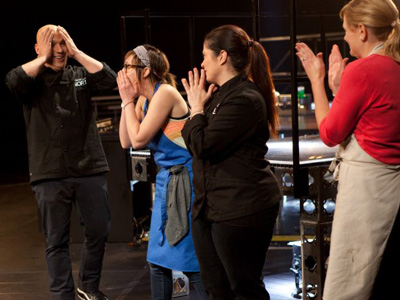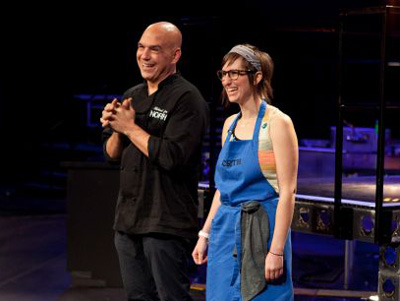Stephanie Goldfarb wins ‘America’s Best Cook’
Permanent link All Posts
Photo credit: Food Network
After a pressure-filled six-week competition, Chicago’s own Stephanie Goldfarb cooked her way to winning the title of “America’s Best Cook” and $50,000 on the Food Network reality series.
Goldfarb, 29, is a senior associate of teen initiatives at the Jewish United Fund/Jewish Federation of Metropolitan Chicago., In addition to her social work expertise, she is known for hosting delicious supper club events to benefit Chicago Women’s Health Center, where she serves on the board. Although vegetarian cuisine is her specialty, Goldfarb entered “America’s Best Cook” a self-proclaimed “recovering vegetarian” and ultimately won the competition by cooking lamb for the final challenge, judged by Food Network icon Bobby Flay.
Hosted by Ted Allen of “Chopped,” the show brought together the best home cooks representing the country’s four regions to learn from and cook for the best chefs on the Food Network. Goldfarb won a spot on Team North in the premiere episode under the tutelage of Michael Symon, who offered his much-needed meat-cooking expertise. Goldfarb also brought her Jewish roots and Israel experiences to the show, cooking latkes and the Israeli breakfast dish shakshuka for different challenges.
The day after her big win, Goldfarb chatted with us from Los Angeles, where she went to be with her family to watch the finale.

Photo credit: Food Network
Describe the feeling of being named “America’s Best Cook” (by Bobby Flay
no less)?
In one word it was surreal. I was
really just trying to survive and I was trying to have a good time, but I never
considered that I would actually have a shot at winning or competing to win
until it was down to two of us. So I was stunned, absolutely stunned, when I
heard it, and to get that information, the news, from Bobby Flay was a real
dream come true. I’ve been watching him on the Food Network since he started
his career on the network. I’ll never forget it.
Just how hard was it to keep a secret?
Let me tell you, it’s been very
hard to keep it a secret, because, first of all, anytime you have good news you
want to share it. And I come from a family of talkers. I knew if I said one
word to anybody it wouldn’t just get around my family, it would probably get
around the entire Jewish community. You can count on Jews for a lot, but
keeping a secret is not one of them [laughing]. I knew it would be worth it if
I could just keep it a secret. I knew I’d get to celebrate like I did last
night and that’s all I could think about, getting to experience that with my
family and how happy they would be once they got to watch the show. It was
hard, but not impossible.
You were so positive and enthusiastic during this whole competition, but
right when the clock stopped after the final challenge we saw your emotional
side. What were you feeling?
If I remember correctly I was
just trying to soak it all up because I knew that was my last time cooking in
that arena, I knew that was my last time cooking for all these incredible
world-class chefs and I was really just trying to stay focused. But also I knew
that I had taken on a huge challenge by cooking meat by myself, without the
supervision of Michael Symon. It was for all or nothing and I knew it had to be
perfect. It’s in my nature to second guess myself, so I think I was also trying
to run through all the steps I took and to make sure I did everything correctly.
What would you say was the most significant way you grew from this
experience, both as a cook and as a person?
As a cook, the most significant
way I grew was that I learned skills in a way that I never would have been able
to learn them in any other setting. To learn one-on-one from an iron chef, and
not just any iron chef – I would have been thrilled to work with any of those
chefs, but Michael Symon is a special guy and he really took his mentorship
seriously. I learned particularly the meat-cooking, but also plating, how to
compose a beautiful and artful plate. And I learned how to put less food on a plate.
He really taught me about editing, which has always been a problem with me. I
tend to really over-feed people and put tons of food on a plate and he really
helped me be a little more selective.
As a person, I’ve always struggled with confidence and a sense of security in myself and [throughout] this competition all I had was me to rely on and I really showed myself that I can compete at a high level,that I can hold my own and that I can trust myself to make good decisions.
What was one thing that we didn’t necessarily see on camera that you
want people to know about your experience on “America’s Best Cook?”
I can’t think of one thing in
particular, but there were so many little moments that I had with the different
iron chefs and with the different contestants that the camera could never show,
behind the scenes, sitting in the hallway waiting for our results or waiting to
hear what the ingredient was. I will say everyone who was competing on that
show was in it for just the best reasons, because they wanted to have fun and
they wanted to learn and they wanted to do something new. I can’t speak for
anybody else, but there was definitely nothing but good feelings among all of
us and we all still talk and we all have relationships with each other and it’s
been nothing but positive.
Now that you’re sure to be asked for advice all the time as the reigning
best home cook in the country, what words of wisdom do you have for those aspiring
to be better home cooks?
I think for aspiring cooks, salt
and citrus are something that home cooks don’t use enough of. To really season
your food properly, don’t be afraid to use whole spices and grind them yourself,
and fresh herbs – it’ll change a dish completely. Not just fresh citrus, but
acids, like vinegars and things, will change a dish completely if you just use
a couple drops here and there. And also something that I learned from Michael
Symon is to edit, really self-edit. You don’t need to put a ton of food on the
plate in order for people to be satisfied. Simple is typically best and that’s
the number one rule I learned when I was on this show.
We’re glad to hear even with your success that you’re still committed to
your teen philanthropy work at JUF and the many other things you do to help
others! What current and future plans do you have for continuing to merge your
passion for cooking with your passion for charitable work?
I’m very committed to my supper
club and using my food as a way to raise money for good causes. I always raise
money for the Chicago Women’s Health Center,an organization that’s very
important to me and to my community, but I’d also really like to expand my
supper club and do more private events for people. I’d also like to make some
money for myself cooking. I’ve started to do that a little bit. I’m really
committed to my work at JUF—I love working in the Jewish community, I love my
teens, and I love the families I work with. I’m really just trying to figure
out how to do it all. There don’t seem to be enough hours in the day, but I’m
going to try to find a couple extra.



.jpg)



